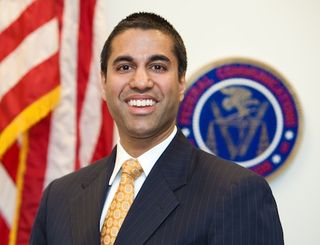Pai: Beware Voluntary Commitments

FCC Commissioner Ajit Pai warned Dec. 19 against government micromanagement of the IP transition, but he also said beware companies bearing voluntary commitments.
That came in a speech at a TechFreedom Forum commemoration of the 100th anniversary of the Kingsbury Commitment, a voluntary pledge to the government by AT&T that Pai says was a "wolf in sheep's clothing."
While AT&T pledged to divest itelf of telegraph competitor Western Union, to stop acquiring independent phone companies and to interconnection with independents, Pai called it a "triumph" for AT&T's strategy to monopolize the industry by "consolidation and regulation" which he says actually shielded it from true competition.
He said it was the beginning of the "cozy" regulated monopoly relationship with the government.
The speech comes as the FCC, under new chairman Tom Wheeler, plans a January launch for a deep dive by the commission into the IP transition, including approving IP trials.
Pai said there should be no new Kingsberry Commitment for the transition to wireless phone and IP delivery.
That means the government 1) should not try to manage that transition, 2) should not confuse the goal of promoting competition with protecting competitors—"our goal today should not be to preserve the position of any particular company in the marketplace or to help one segment of the industry gain regulatory advantages over its rivals"—and should 3) "beware of businesses bearing commitments."
Broadcasting & Cable Newsletter
The smarter way to stay on top of broadcasting and cable industry. Sign up below
"Companies do not offer commitments out of the goodness of their hearts. Instead, as in the case of the Kingsbury Commitment, these commitments are generally designed to serve a company’s self-interest," he said. "This is entirely understandable, of course. But we regulators must keep it in mind when companies come to our door."
He also pointed out that voluntary commitments aren't really voluntary with a regulators gun to their heads.
Contributing editor John Eggerton has been an editor and/or writer on media regulation, legislation and policy for over four decades, including covering the FCC, FTC, Congress, the major media trade associations, and the federal courts. In addition to Multichannel News and Broadcasting + Cable, his work has appeared in Radio World, TV Technology, TV Fax, This Week in Consumer Electronics, Variety and the Encyclopedia Britannica.

